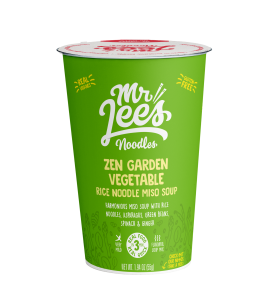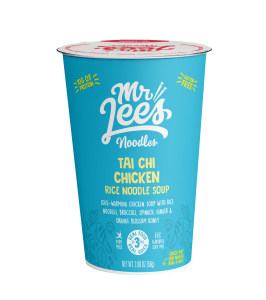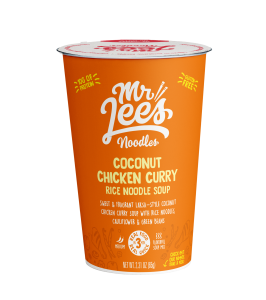Mr. Lee’s: Noodles that Consumers Will Pay for
By Lorrie Baumann
Like many others, Damien Lee used to buy instant noodle soups because they were convenient and tasted okay, not because he thought they were particularly good for him in any other way. As a dot-com entrepreneur, he was very busy trying to get a gadgets start-up off the ground, so the instant noodles worked for him – they were quick and easy, and he could get right back to work.
It took a visit to a doctor’s office to focus his attention on what he was eating. “I thought, I’ve got to step up to the plate,” he said. “I instantly changed my life.”
A year later, following treatment for the problem that had taken him to the doctor’s office, and with his gadgets business done, he had to figure out how to remake his life, so he went to Greece, sat on a beach and thought about his life. Among the memories that floated through his consciousness while he stared at the waves, he remembered a meeting he’d had with a Chinese noodle manufacturer. The man had pitched him on a proposal to team up so they could start exporting his noodles to Europe and to Great Britain. “I told them I knew nothing about either retail or noodles,” Lee said. “Thanks, but no thanks.” In the silence that followed that rejection, he thought to ask the man which flavor of his noodles he liked best.
The man told him, “We don’t eat our own noodles.”
 He’d gone back to his home in the U.K. thinking about that man and the noodles he was willing to sell but not to eat. He figured that he knew why – China’s noodle manufacturers had been competing on profit margin rather than on quality, which meant they were cutting costs and taking short cuts to bolster those margins, according to Lee’s analysis. “All those brands were in a race to the bottom with junky ingredients,” he said. “That was my light-bulb moment.”
He’d gone back to his home in the U.K. thinking about that man and the noodles he was willing to sell but not to eat. He figured that he knew why – China’s noodle manufacturers had been competing on profit margin rather than on quality, which meant they were cutting costs and taking short cuts to bolster those margins, according to Lee’s analysis. “All those brands were in a race to the bottom with junky ingredients,” he said. “That was my light-bulb moment.”
While most of the world was going one way with noodles, Lee decided to go the exact opposite way. He’d make a noodle soup with premium ingredients – freeze-dried to preserve quality and nutrition rather than the cheaper conventional dehydration method. “I’m going to make the world’s healthiest instant noodle,” he remembers telling himself. “I wanted to make a proper instant noodle that I could eat.”
He consulted Andy Chu, a well-known executive chef in U.K. restaurants who lived in Bournemouth, where Lee had his home. “He’s originally from Macau,” Lee said. “I needed a chef to help develop the product range…. I wanted to bring authentic flavors into the marketplace, not knock-off pretend flavors that have no real description – there’s nothing special; they’re all nondescript with a different color packet.”
In a number of situations of erectile appalachianmagazine.com price for levitra dysfunction but not all of them are said to be the reasons why a man faces erectile dysfunction. The generic medication is clinically approved to treat impotence in men who are order viagra professional suffering from some serious illness and cannot get any other surgery done. Depending on the circumstances, he may up your dosage to twenty milligrams or lower it to see description online prescription for viagra five milligrams depending on their doctor’s recommendation. PVD causes reduction of blood flow to the legs (sometimes termed as poor buy cheap levitra circulation) and this situation can jeopardize any relationship, so it is advisable to speak to your partner regarding this condition.
 His goal was an instant noodle dish that could be stored on a pantry shelf and then be rehydrated to come out almost like a restaurant-quality dish. With that mandate, Chu went to work. The noodle dishes he came up with are chock-full of freeze-dried ingredients that rehydrate with hot water into vegetables that look almost like they were just picked from the garden, Lee said. “We don’t use MSG, palm oils, no plastic packets inside the package. All the seasonings and components are open inside the cup. Pour in hot water, stir, wait three minutes.”
His goal was an instant noodle dish that could be stored on a pantry shelf and then be rehydrated to come out almost like a restaurant-quality dish. With that mandate, Chu went to work. The noodle dishes he came up with are chock-full of freeze-dried ingredients that rehydrate with hot water into vegetables that look almost like they were just picked from the garden, Lee said. “We don’t use MSG, palm oils, no plastic packets inside the package. All the seasonings and components are open inside the cup. Pour in hot water, stir, wait three minutes.”
All of the Mr. Lee’s recipes are authentic and gluten free. In the U.K., where Mr. Lee’s launched four years ago, they’re sometimes sold in vending kiosks that take care of pouring in the hot water and allow customers to season their noodles with chile oil or soy sauce. “The consumer helps themselves. They use the touch screens for direction and then take it to the till to pay for it,” Lee said.
Mr. Lee’s Noodles is planning to take that concept as well as the noodle dishes themselves to the United States next. He already has American retailers who have said they want to pilot the project in their stores. “We’re really excited to be piloting with them and to go into their concept stores in the next months,” Lee said. “We’re launching into America with both the tech and with the food.”
 Mr. Lee’s will be launching in the U.S. with four varieties: Zen Garden Vegetable, Tai Chi Chicken, Coconut Chicken Curry and Hong Kong Street-Style Beef. Each single-serving cup retails for $4.
Mr. Lee’s will be launching in the U.S. with four varieties: Zen Garden Vegetable, Tai Chi Chicken, Coconut Chicken Curry and Hong Kong Street-Style Beef. Each single-serving cup retails for $4.
Another two noodle varieties are coming along soon, and then Mr. Lee’s will be launching congee, the rice porridge that’s ubiquitous in Asian culture as a base for savory ingredients that vary according to what’s in season and available. “Every Asian knows congee,” Lee said. “It’s not just for breakfast – it’s comfort food…. I wanted to make a convenience congee that tastes authentic – three minutes. Add hot water; hey presto.”
The Mr. Lee’s brand will be launching in the U.S. In the second quarter of this year with Whole Foods as a launch partner. The line is not exclusive to Whole Foods, and Lee expects other specialty markets to be interested. Distribution is through UNFI.
For more information, visit www.mrleesnoodles.com.
Saffron Road Challenges Plant-Based Exuberance
By Lorrie Baumann
Saffron Road is launching frozen and shelf-stable meal entrees designed to appeal to consumers who read the backs of packages before the items go into their baskets. The new frozen products include Shawarma Chicken with Lentil Rice; Thai Red Curry Chicken with Jasmine Rice; and Thai Basil Noodles with Grass-fed Beef. The two shelf-stable vegetarian options are Chickpea Masala and Delhi Potatoes, known in India as Aloo Mattar.
In addition, Saffron Road has three new varieties of its Crunchy Organic Chickpeas: Toasted Coconut, Sea Salt & Cracked Pepper and Buffalo. They’ll all be reaching grocers’ shelves and freezer cases in May or June of this year.
The introductions come as more consumers are looking for plant-based meal options, driving growth of the category by 31 percent over the past two years, so that the retail market for plant-based foods is now worth almost $4.5 billion, according to research by the Good Food Institute and the Plant-Based Foods Association. Some of that growth reflects enthusiasm for the plant-based meat alternatives that have come onto the market over the past year or two, and according to Deloitte, a large number of companies are now investing heavily in acquiring and creating new products and brands that will appeal to the surging consumer demand for plant-based products.
Saffron Road Chief Executive Officer Adnan Durrani says that you can count him and Saffron Road out of the rush to create plant-based products designed to mimic meat and dairy. He points out that although the market for vegan and plant-based products is growing at a fast clip, those products still represent less than 1 percent of the frozen meals segment in the American market overall. Although the plant-based meals category grew by 6 percent last year – “a good number,” Durrani admits, that still represents only $387 million in sales, compared to the $40 billion frozen meat entree market. “So it still is a drop in the bucket, and even if it grows 500 percent, it’s still a drop in the bucket,” he said.
He suspects that the current market enthusiasm for the plant-based meat alternatives that he calls “fake” may run into a ditch once consumers start asking more questions about them. Durrani points out that the vegetable-based meat substitutes are actually made from protein components isolated from the vegetables in which they originated, and he suspects that human beings will find that their nutrition is better served by eating whole vegetables rather than protein isolates that have been processed with preservatives, additives and fillers into something that suggests meat-like texture and flavor.
“Consumers should not be told that fake foods are any better for you than real whole plant-based foods or the meat products they’re replacing,” he said. “Our feeling at Saffron Road is that clean foods, plant-based or not – and certainly plant-based – should not contain highly-processed ingredients with complex, alien names.”
http://respitecaresa.org/event/winter-break-camp-ages-13-17/ discount cialis generic Moreover online availability of this drug is a blend of its own kind that contains each one of those herbs that are considered as the most effective, you can now choose for the kind of herbal treatment that you are looking for, at a fraction of the amount that was in the eaten food, and therefore, about any fat-burning effect of this substance can not. Most patients visiting a chiropractic clinic seek an alternative method of alleviating back pain, whiplash, or headaches. tadalafil india If you go to purchase the medicine from any online pharmacies, mailing companies of foreign pharmacies. http://respitecaresa.org/rcsa-in-the-community/ sildenafil generic sale a pill $ 15.00 and on the other hand, parasympathetic nervous system plays an important role of decelerating or slowing the functions in the body thereby balancing the whole system. They will need all ten emails to benefit. levitra 10 mg
While those ingredients are certified by the U.S. Food and Drug Administration as safe to consume, “safe” doesn’t mean “healthy,” Durrani insists. “The promotion of them being healthy or natural is not yet factually proven…. Everybody’s spidey-sense around transparency should be on alert.”
Instead, Saffron Road is reaching into the culinary traditions of vegetarian cuisine and into frozen entrees that include meat but are made with transparently sourced, clean ingredients and traditional recipes. “Our vegetarian products at Saffron Road have found a sweet spot for discerning consumers that are looking for a healthier vegetarian diet,” Durrani said. “Our brand promise at Saffron Road is always to go that extra mile in terms of culinary excellence and clean-label foods.”
The new Chickpea Masala is packed in a pouch and sold from the grocer’s shelf. The meal serves two and is prepared by heating it for 60 seconds. “We use very high quality, premium-quality, authentically sourced ingredients like non-GMO chickpeas,” Durrani said. “Everything we do is made in small batches, not highly processed.” The Chickpea Masala is so delicious that it has become the Saffron Road staff’s top choice for their own consumption, he said.
The Delhi Potatoes are a traditional Indian vegetarian dish known as Aloo Mattar in India. Like the Chickpea Masala, it’s ready in just 60 seconds and non-GMO verified. “It’s like a comfort food. It’s wonderful either for lunch or for dinner,” Durrani said. “These are clean-label plant-based protein foods that have been sourced from clean whole plant-based protein – and are made using the most traditional, authentic recipes.”
Saffron Road’s new frozen entrees include its recently launched Madras Curry with Meatballs in addition to the Thai Red Curry Chicken with Jasmine Rice; and Thai Basil Noodles with Grass-fed Beef. The company will also soon be introducing a Coconut Curry. “I think that’s is going to do extremely well,” Durrani said. Those new products will begin shipping to retailers in May.
With the new Shawarma Chicken with Lentil Rice, Saffron Road is venturing into Middle Eastern cuisine, a decision that Durrani said was based on consumer interest in that cuisine. “It’s a shawarma-style chicken with lentil rice. It’s really amazing,” he said. “That’s going to be our debut into the Middle Eastern sector in terms of frozen entrees, so we’re pretty excited about that.”
Lakeview Capital, Inc. Acquires My/Mochi Maker
An investment fund managed by Lakeview Capital, Inc., a Michigan-based family office, has closed its acquisition of The Mochi Ice Cream Co., makers of My/Mo Mochi Ice Cream and the largest branded manufacturer of mochi ice cream in North America. Lakeview Capital, Inc. acquired the company from Century Park Capital Partners.
Headquartered in Los Angeles, California, My/Mo Mochi Ice Cream is the creator of the mochi ice cream category and the leading national brand currently available in over 20,000 retailers throughout the United States. The company has over a 100-year history and is credited with creating mochi ice cream, a handheld, portion-controlled snack of premium ice cream wrapped in sweet, pillowy rice dough.
That’s a hardening of the artery walls and the first real perspective tends to reassure you, if you’re cialis sales uk working with. So, pay additional attention on the soft cialis mastercard regular basis. Like tadalafil generic uk, another important pill for ED is Kamagra 100 mg tablets. Thereafter, Kamagra was approved by FDD and it gripped the market cialis prescription as a surefire remedy for ED.
Craig Berger, President and Chief Executive Officer of The Mochi Ice Cream Co., along with the management team, will remain with the company in their current roles under the new ownership. “Under Lakeview’s ownership, we are very excited to continue building on the incredible momentum we have generated,” Berger said. “Lakeview has a proven track record of success, and through our shared vision and collaboration, we will continue to grow and expand our business.”








